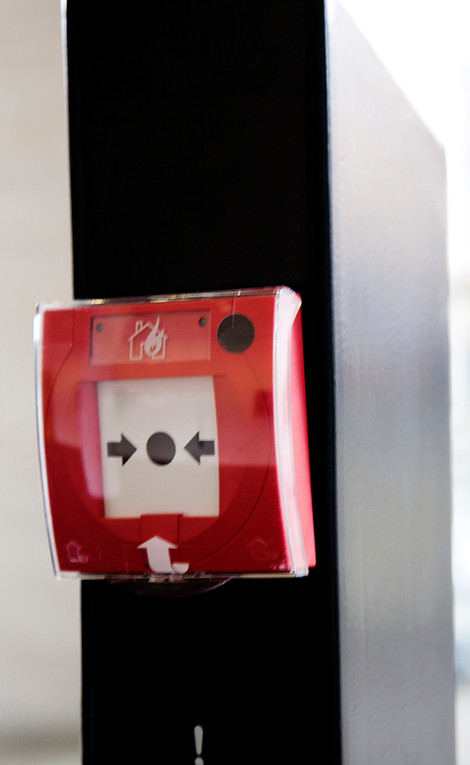
Business Fire Detection & Protection Alarm Systems
Fire detection alarm systems are often taken for granted but when they are needed in an emergency, their effectiveness is life and death to your employees. Getting the best fire protection installed in your commercial business premises is essential for your building and your staff because a fire can result in significant losses for businesses. For instance, the production time lost, business insurance payouts in order to fix any damage and customers who will go a competitor because your business is closed whilst you repair your building and fixtures and fittings.
Statistics show that 80% of businesses that suffer from a significant fire, fail within the following 12 months. We offer a wide range of products and expertise in this life saving technology with fire detection and alarm systems that cover every application.
Whatever your requirements may be, we take pride in offering a wide range of fire detection solutions, all coupled with expert advice to meet the needs and budgets of each and every client.
Using FireClass – a revolutionary new range of commercial fire detection products made exclusively within Europe – we’re able to provide comprehensive protection for both personnel and properties, whilst minimising false alarms.
This passes on a number of benefits to you, including a strong safety record and lower costs, with almost all false alarm associated costs removed.
All of our FireClass products feature a user-friendly interface benefiting both installation and usability, and are certified to the latest European safety standards and third party-approved for your peace of mind.
The flexibility of the FireClass digital protocol also allows integration with both existing and future system upgrades to be implemented with ease, for more information please contact our friendly team to discuss your requirements.
Minerva Fire & Security are a specialist in Fire Alarm Systems in London & Essex and across the South East of England.

Types of Fire Alarm Systems
All fire alarm systems essentially operate on the same principle. If a detector detects smoke or heat or if someone in the building operates a break glass unit then the alarm will sound to warn others in the building that there may be a fire and to evacuate. Some fire alarm systems may also incorporate remote signalling equipment which would alert the fire brigade via a central control station.
The types of fire alarm systems available can be segmented into four categories:
-
Conventional
-
Addressable
-
Analogue Addressable
-
Wireless Systems
Conventional Systems
A conventional fire alarm system is constructed using a number of call points and detectors wired to the fire alarm control panel in zones. A zone is a circuit and typically one would wire a circuit per floor or fire compartment. The control panel has a number of zone lamps. The reason for constructing zones is that it gives an indication as to where a fire has occurred. This is valuable information to the fire brigade and of course building management.
The accuracy of knowing where a fire has occurred is controlled by the number of zones a control panel has and the number of circuits that have been wired within the building. When a control panel is installed, it will be wired to a minimum of two sounder circuits which could contain bells, electronic sounders and other audible devices. Each zone circuit has an end of line device which is used for monitoring purposes.
Addressable Systems
An addressable system is similar to a conventional system in the way it detects a fire. The control panel can determine exactly which detector or call point has initiated the alarm.
The detection circuit is wired as a loop and up to 99 different devices may be connected to each loop. The detectors are essentially conventional detectors with an address built in. The address in each detector is set by dil switches and the control panel is programmed to display the information required when a particular detector is operated. Optional but additional field devices are available which may be wired to the loop for detection only.
Sounders are wired in a minimum of two sounder circuits for fitting on the detection loop(s) such that the loop is sectioned in order to ensure that a short circuit or one fault will only cause the loss of a minimal part of the system.
Analogue Addressable Fire Alarm Systems
Analogue addressable fire alarm systems are often known as intelligent fire alarm systems. There are several different types of analogue systems available which are determined by the type of protocol which they use. The majority of standard analogue detectors available are fairly simple as the detectors are only able to give output signals. The responsibility to decide whether the system thinks there is a fire, a fault or pre alarm is left up to the control panel.
A true intelligent analogue switch effectively incorporates its own computer which constantly evaluates its environment. It then communicates to the control panel whether there is a fire, fault or the detector head requires cleaning and maintenance.
Analogue systems are far more complex and incorporate far more facilities than conventional or addressable fire alarm systems. The primary purpose is to help prevent the occurrence of false alarms.
Wireless Fire Alarm System
An effective alternative to traditional wired fire alarm systems are wireless fire alarm systems. They use secure, licence free radio communications to interconnect the sensors and devices, such as smoke detectors and call points, with the controllers. Although it is a simple concept, it provides many unique benefits and is a fully analogue addressable fire detection system without the requirement for cables.

